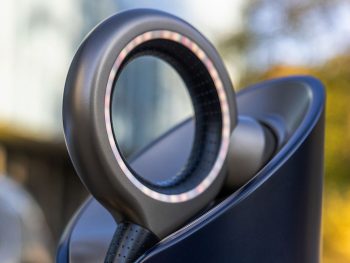Raft of global zero-emission vehicle pledges and new charge point unveil at COP26 Transport Day
Transport Day at COP26 is now underway, marked with a series of global zero-emission pledges and the unveil of a new charge point design by the UK government.

The new UK design for electric vehicle charge points is intended to make them as iconic as the British post box, London bus or black cab
The commitments include confirmation by the UK that it will ban all diesel and petrol HGVs by 2040, as Transport Secretary Grant Shapps said zero-emissions travel “has reached a tipping point”.
The global-first HGV pledge, proposed in this summer’s Transport Decarbonisation Plan, follows on the back of the 2030 ICE phase-out for cars and vans and ensures that sales of all polluting road vehicles will end in the UK within the next two decades.
Several initiatives are also being launched today at COP26 to help ensure a global and equitable transition to zero-emission vehicles (ZEVs) and support the acceleration of transport decarbonisation.
A total of 24 countries, six major vehicle manufacturers – GM, Ford, Mercedes, BYD, Volvo, and Jaguar Land Rover – 39 cities, states and regions, 28 fleets and 13 investors have all jointly set out their determination for all new car and van sales to be zero-emission by 2040 globally and 2035 in leading markets.
This includes commitments to 100% zero-emission vehicles by countries including El Salvador and New Zealand and companies such Sainsbury’s.
This follows proposals made by the EU, Chile, Canada and a number of US states this year to ensure all new cars are zero emission by 2035.
A number of emerging markets and developing economies have also committed today to drive adoption of zero-emission vehicles, including India, Ghana, Kenya, Paraguay, Rwanda and Turkey.
In total, 30 countries have now agreed to work together to make zero-emission vehicles the new normal by making them accessible, affordable and sustainable in all regions by 2030 or sooner.
New initiatives revealed today also include the World Bank’s Global Facility to Decarbonise Transport – a multi-donor trust fund that will mobilise US$200m (£148m) over the next 10 years to support the decarbonisation of road transport in emerging markets and developing economies in the Global South. This includes an initial £4m contribution from the UK.
Today will also see the Zero Emission Vehicle Transition Council (ZEVTC), which launched last year, meet with representatives, including experts on the transition in emerging markets and developing economies, to discuss how international collaboration can support a global transition.
The council will launch its first annual action plan, which sets out areas for sustained international cooperation to accelerate the transition during 2022. And the US will now join the UK as co-chair of the ZEVTC.
The UK’s Department for Transport also published new research showing huge growth in the global zero-emission vehicle market. Since 2019, global sales of zero emission vehicles (ZEVs) have more than doubled, from 2.1 million to 5.3 million.
And ZEVs are forecast to be 70% of all new car sales in 2040, with this projection having doubled in the last five years.
It also reveals that 19% of 2020 passenger vehicles sales were in countries that now have an internal combustion engine (ICE) phase-out date, up from 5% in 2019.
The UK government has also today unveiled a new design for electric vehicle charge points that’s intended to make them as iconic as the British post box, London bus or black cab.
First announced this summer, the concept has been designed together with the Royal College of Art and PA Consulting and prioritises inclusivity and ease of use.
UK Transport Secretary Grant Shapps said: “From our roads to the skies, the transition to zero-emission transport has reached a tipping point. We know that transport plays a key role saving the planet from warming above 1.5°C, which is why this is the COP that will kick start our ambition for zero-emission aviation and why I’m proud to be uniting world leaders to tackle climate change – creating new opportunities for clean growth, green jobs and improved air quality right across the globe.
“To support the transition to EVs, it’s integral that we have the infrastructure to support it. My vision is for the UK to have one of the best EV infrastructure networks in the world, with excellent British design at its heart.”







